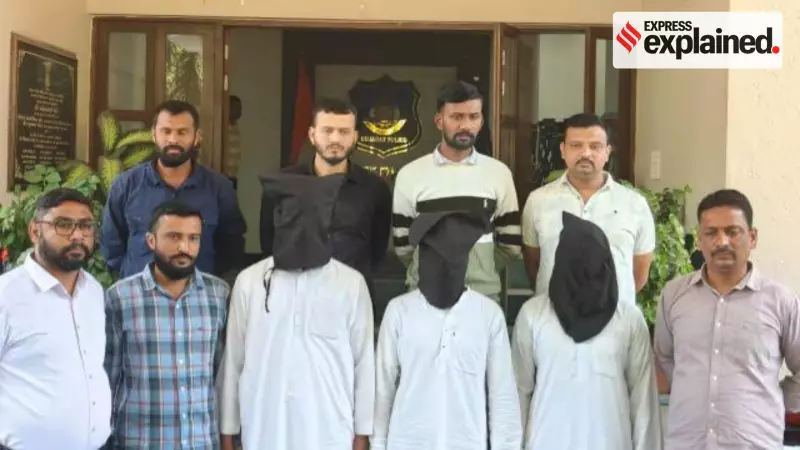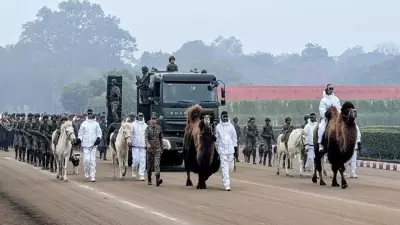
In a significant move to strengthen national security, the Gujarat Police has launched a massive operation to compile comprehensive dossiers on individuals involved in anti-national activities over the past three decades. This initiative comes days after the devastating blast outside Delhi's Red Fort that claimed 12 lives and the uncovering of an alleged ricin terror plot in Ahmedabad.
100-Hour Deadline for Statewide Operation
On November 17, Gujarat Director General of Police Vikas Sahay issued a crucial directive to all police stations across the state. The order gives police personnel exactly 100 hours - until November 22 - to complete the task of compiling detailed dossiers on individuals with connections to anti-national activities since 1995.
The comprehensive database will include people who have been booked, convicted, acquitted, or jailed in terror cases over the last 30 years. Additionally, the police are tracking those currently known to be involved in activities deemed anti-national. The directive specifically requires information about current whereabouts of all individuals under scrutiny.
Massive Scale of Anti-National Database
The Gujarat Anti-Terrorist Squad (ATS) maintains an extensive state dossier containing more than 20,000 individuals categorized as anti-national elements across Gujarat's 34 districts. According to senior police officials, approximately 40% of these individuals - about 8,100 people - are concentrated in four major cities.
Surat leads with 3,800 individuals, followed by Ahmedabad with 2,500, Rajkot with 1,350, and Vadodara with 450 people on the anti-national watchlist. This dossier, initially created under DGP Sahay's orders on August 23, 2024, will now be updated annually as per the new directive.
Broad Scope of Criminal Activities Under Scanner
The police verification exercise covers individuals booked under six major crime categories. These include The Arms Act, the Narcotics, Drugs and Psychotropic Substances (NDPS) Act, the Explosives Act, and cases involving Fake Indian Currency Notes (FICN).
The net also extends to those involved under stringent anti-terror laws including TADA, POTA, MCOCA, UAPA, and violations under the Petroleum Act and Rules. This broad approach reflects the police's strategy to examine all potential security threats comprehensively.
Why the 30-Year Timeframe?
A police officer from Saurashtra region explained the rationale behind the three-decade timeframe. "The average age of those involved in serious crimes we're monitoring falls in the 25-35 years range. Tracking 30 years of data helps us understand patterns and connections that might otherwise be missed," the officer stated.
The police have prioritized individuals associated with banned organizations like the Students Islamic Movement of India (SIMI) and those involved in major terrorism cases with mass casualties, such as the 2008 Ahmedabad bomb blasts.
Ground Operations and Verification Process
The Special Operations Groups (SOGs) across districts have already begun ground verification work. In Ahmedabad, the SOG visited Juhapura to check on individuals previously accused in the 2008 bombings case. Similarly, Surat police are combing through records of people associated with SIMI.
Police officials emphasize that this exercise serves dual purposes - updating the state dossier and creating a deterrence effect against potential anti-national activities. The verification process also enables police to take immediate action against anyone currently involved in illegal activities.
Inclusive Approach to Crime Prevention
The Gujarat Police defense their comprehensive approach that includes even those involved in what might be considered lesser crimes. A senior officer involved in the operation explained, "The person who sells an illegal gun probably doesn't know the weapon's final purpose. We must examine all who could contribute to activities that may lead to major incidents."
This perspective gained validation during the recent ricin case investigation on November 8, when Gujarat ATS arrested three men allegedly planning a major terror attack and seized three pistols that were reportedly smuggled across the Pakistan border.
The dossier compilation includes extensive personal details - names, addresses, contact information, close relatives' details, criminal affiliations, modus operandi, fingerprint records, case histories, local haunts, and known associates. For individuals with cases in multiple districts, the police in their current residential district maintain jurisdiction.
Meanwhile, the ATS continues monitoring people who have moved away from Gujarat. As one officer clarified, "Our primary motive is verification, not apprehension or detention unless there's substantial reason for such action."





